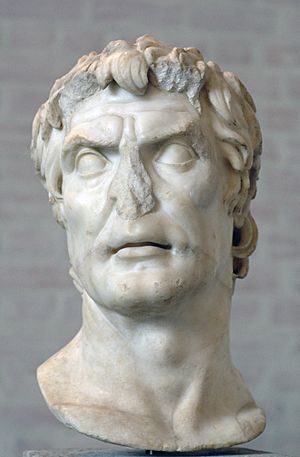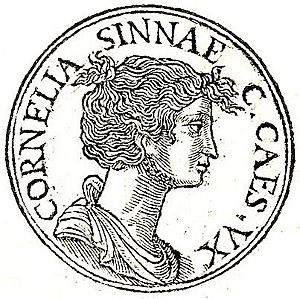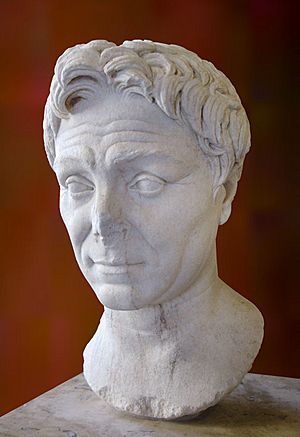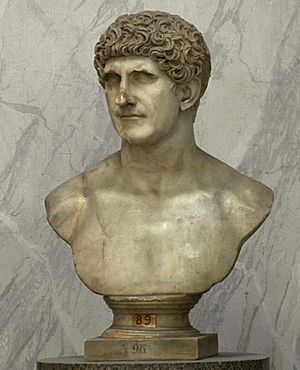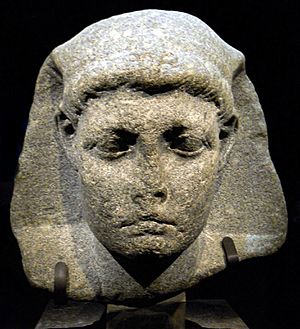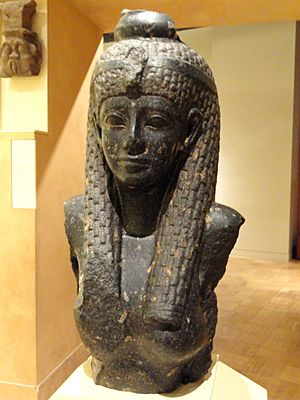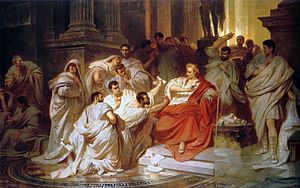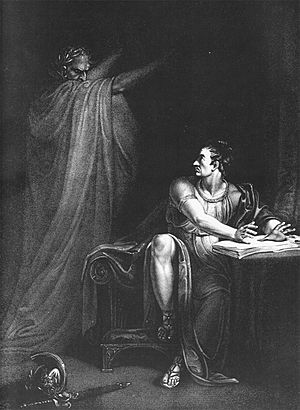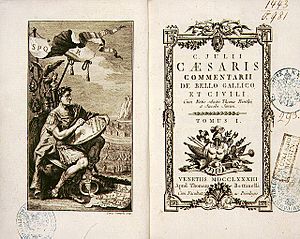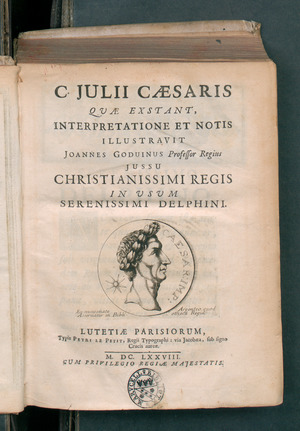Julius Caesar facts for kids
Quick facts for kids Gaius Julius Caesar |
|||||
|---|---|---|---|---|---|
| Consul and Dictator of the Roman Republic | |||||
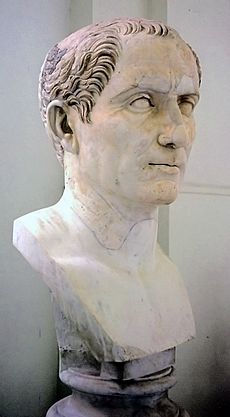
Bust of Julius Caesar
|
|||||
| Reign | October 49 BC – 15 March 44 BC (as dictator and/or consul) |
||||
| Born | July 100 BC Rome |
||||
| Died | 15 March 44 BC Theatre of Pompey, Rome |
||||
| Issue | Julia Caesaris 85/84–54 BC Caesarion 47–30 BC Augustus 63 BC–AD 14 (grand-nephew, posthumously adopted as Caesar's son in 44 BC) |
||||
|
|||||
| House | Julio-Claudian | ||||
| Father | Gaius Julius Caesar (proconsul of Asia, 90s BC) | ||||
| Mother | Aurelia Cotta | ||||
Gaius Julius Caesar (born around July 100 BC – died March 15, 44 BC) was a very important military leader, politician, and writer in ancient Rome. He lived at the end of the Roman Republic.
Caesar joined a powerful group called the First Triumvirate. When this group broke apart, he fought a civil war against Pompey the Great. After winning the war, Caesar became the Roman dictator for life. Sadly, his enemies killed him in Rome.
Later Roman rulers used the name “Caesar” as a special title. This title was later copied in other countries, like “Kaiser” in Germany and “Tsar” in Russia.
Contents
Early Life and Challenges
Julius Caesar was born in Italy around July 100 BC. We don't know the exact date. When he was sixteen, he became the head of his family. Soon after, he faced danger when Lucius Cornelius Sulla became the Roman dictator.
Sulla started getting rid of people he didn't like in Rome. Hundreds were killed or sent away, and Caesar was on Sulla's list. His mother's family begged for his life. Sulla agreed, but he took away all of Caesar's family money. From then on, not having enough money was a big problem for Caesar. He joined the army and left Rome.
While traveling across the Aegean Sea, Caesar was captured by pirates. He stayed calm and acted like he was in charge, even as a prisoner. When the pirates asked for a ransom of twenty talents of silver, Caesar told them to ask for fifty! After his ransom was paid, Caesar gathered a fleet of ships. He chased, captured, and imprisoned the pirates. He then had them crucified, just as he had promised them while he was their prisoner. The pirates had thought he was joking. Soon, Caesar was called back to fight in the army.
Rising in Politics
When Caesar returned to Rome, he was elected as a military tribune. This was his first step in a political career. He was elected quaestor for 69 BC. His wife Cornelia died that same year. After her funeral, Caesar went to serve his quaestorship in Spain. In 67 BC, he married Pompeia, a granddaughter of Sulla. He later divorced her. In 63 BC, he ran for the important job of Pontifex Maximus, the high priest of the Roman state religion. He ran against two powerful senators. There were rumors of bribery from all sides. Caesar won easily, even though his opponents had more experience.
After being a praetor, Caesar was chosen to govern Roman Spain. But he was still in a lot of debt and needed to pay back his lenders. He asked Marcus Licinius Crassus, one of Rome's richest men, for help. Crassus paid some of Caesar's debts and promised to cover others. In return, Caesar gave Crassus political support. Caesar left for his province before his praetorship had even ended. In Spain, he defeated two local tribes. His soldiers called him imperator, which meant "commander." He finished his time as governor with a great reputation. He was supposed to have a special parade in Rome called a 'triumph.' But he also wanted to run for Consul, the most important job in the Republic. Caesar chose to run for Consul instead of having the parade. He was elected and became a consul in 59 BC.
The First Triumvirate
Caesar joined forces with Gnaeus Pompeius Magnus (Pompey the Great) and Marcus Licinius Crassus. These three powerful men ruled Rome together. Their group was called the Triumvirate.
Caesar helped Crassus and Pompey get along, as they had been arguing for years. Together, they had enough money and political power to control public decisions. This unofficial alliance was known as the First Triumvirate (meaning "rule of three men"). To make their alliance stronger, Pompey married Caesar's daughter, Julia. Caesar also married again, this time to Calpurnia, whose father was another powerful senator.
Caesar suggested a law to give public lands to poor people. Pompey supported this idea, even if it meant using force. Crassus also agreed, which made the Triumvirate's power clear to everyone. Pompey filled the city with soldiers, which scared the Triumvirate's opponents.
Caesar's Gallic War
With his partners' agreement, Caesar became the governor of Gaul. Gaul is the area that is now Northern Italy, Switzerland, and France.
Caesar was the commander of the Roman armies during the Gallic War. The war was fought to help Rome's Gallic friends against the Germans, who wanted to invade Gaul. It also helped Rome take more control of Gaul. Caesar's victories in Gaul made Rome's territory reach all the way to the North Sea. In 55 BC, he led the first Roman invasion of Britain. Caesar wrote about this eight-year war in his famous book De Bello Gallico (which means 'About the Gallic Wars'). This book, written in Latin, is a very important historical record.
These achievements gave Caesar great military power. This started to make Pompey feel less important. The balance of power changed even more when Crassus died in 53 BC.
Caesar's Civil War
In 50 BC, the Senate, led by Pompey, told Caesar to send his army home and return to Rome. His time as governor had ended. Caesar worried he would be put on trial if he entered Rome without the special protection that officials had. Pompey accused Caesar of not following orders and of treason.
Crossing the Rubicon
Caesar and his army marched towards Rome. In 49 BC, they crossed the Rubicon, a small river in north-east Italy. This river was the boundary that no army was supposed to cross. Crossing it meant starting a civil war. Pompey, who was the official Consul, and his friends quickly fled Rome as Caesar's army got closer.
Pompey managed to escape before Caesar could catch him. Caesar decided to go to Spain, leaving Italy under the control of Mark Antony. Caesar made an amazing 27-day march to Spain. There, he defeated Pompey's officers. Then he returned east to fight Pompey in Greece. In July 48 BC, at Dyrrhachium, Caesar almost lost badly. But later that year, he completely defeated Pompey at the Battle of Pharsalus.
Dictator at Last
In Rome, Caesar was made Dictator, with Mark Antony as his second-in-command. Caesar oversaw his own election to a second consulship. After only eleven days, he gave up this dictatorship.
Late in 48 BC, he was made dictator again, this time for one year. Caesar then chased Pompey to Egypt, where Pompey was soon murdered. Caesar then got involved in an Egyptian civil war. This was between the young pharaoh and his sister, wife, and co-ruler, Queen Cleopatra. Perhaps because the pharaoh played a part in Pompey's murder, Caesar sided with Cleopatra. People say he cried when he saw Pompey's head, which the pharaoh offered him as a gift. Caesar defeated the pharaoh's forces in 47 BC and made Cleopatra the ruler.
Caesar and Cleopatra celebrated their victory with a grand parade on the Nile River in the spring of 47 BC. Their royal boat was joined by 400 other ships. This showed Caesar the fancy lifestyle of the Egyptian pharaohs. Caesar and Cleopatra never married because Roman law only allowed marriages between two Roman citizens. Caesar continued his relationship with Cleopatra even during his last marriage, which lasted 14 years. He might have had a son with her named Caesarion. Cleopatra visited Rome more than once, staying in Caesar's villa outside Rome, across the Tiber.
In 46 BC, Caesar defeated Cato the Younger and the last of Pompey's supporters in Africa. He was then made dictator for ten years. In just two years, he made many changes to Roman government to improve the Republic. Many of these changes were meant to make life better for ordinary people. One lasting change was his reform of the calendar. This is the calendar we still use today, with a leap day every four years. In February 44 BC, just one month before he was killed, he was made Dictator for life.
Assassination
On the Ides of March (March 15) in 44 BC, Caesar was supposed to go to a meeting of the Senate. Mark Antony, fearing the worst, tried to stop Caesar. But the people planning to kill Caesar expected this and arranged for someone to stop Mark Antony.
According to the historian Eutropius, about sixty or more men took part in the assassination. Caesar was stabbed 23 times. Another historian, Suetonius, later said that a doctor found only one wound, the second one to his chest, was deadly. No one knows for sure what the dictator's last words were. It's a topic that historians still discuss. The most famous version in English is the Latin phrase Et tu, Brute? (meaning 'You too, Brutus?'). In Shakespeare's play Julius Caesar, this is part of the line: "Et tu, Brute? Then fall, Caesar."
According to Plutarch, after the killing, Brutus stepped forward to speak to the senators. However, they all ran out of the building. Brutus and his friends then marched to the Capitol, shouting to their city: "People of Rome, we are once again free!" But they were met with silence. The people of Rome had locked themselves inside their homes as soon as they heard what had happened.
A wax statue of Caesar was put up in the forum, showing all 23 stab wounds. A crowd gathered there and started a fire, which badly damaged the forum and nearby buildings. In the chaos that followed, Mark Antony, Octavian (later Augustus Caesar), and others fought a series of five civil wars. These wars eventually led to the creation of the Roman Empire.
The Roman Empire and its emperors were so important in history that the word Caesar was used as a title in some European countries to mean emperor. This happened even long after the Roman Empire was gone. For example, Germany's emperor was called a Kaiser until 1919 AD, and Russia's emperor was called a Tsar until 1917 AD.
Caesar as a Writer
Caesar was also an important writer. His main works include:
- The Commentarii de Bello Gallico (Commentaries on the Gallic War). This book describes his military campaigns in Gallia and Britannia while he was a proconsul.
- The Commentarii de Bello Civili (Commentaries on the Civil War). This book covers the events of the Civil War until just after Pompey's death in Egypt.
These books were written and published each year during or right after the actual battles. They were like "reports from the front lines." Even though they seem simple and direct, they are actually very clever. Caesar's Commentarii are often studied by students learning Latin. They were written for educated people in Rome, Italy, and the provinces.
Images for kids
-
Gaius Marius, Caesar's uncle.
-
Vercingetorix surrenders to Julius Caesar, in a painting by Lionel Royer.
-
A Roman bust of Pompey the Great.
-
This Roman wall painting from Pompeii likely shows Cleopatra VII as Venus Genetrix, with her son Caesarion as Cupid.
-
The Death of Caesar, by Jean-Léon Gérôme, 1867.
-
Bust of Mark Antony.
-
Gaius Julius Caesar Octavianus, Caesar's adopted heir.
-
Reliefs of Cleopatra and her son by Julius Caesar, Caesarion, at the Temple of Dendera.
-
Flowers placed on the remains of the altar of Caesar in the Roman Forum of Rome, Italy.
-
Modern bronze statue of Julius Caesar, Rimini, Italy.
-
Bust in Naples National Archaeological Museum, photograph published in 1902.
See also
 In Spanish: Julio César para niños
In Spanish: Julio César para niños
 | Isaac Myers |
 | D. Hamilton Jackson |
 | A. Philip Randolph |


